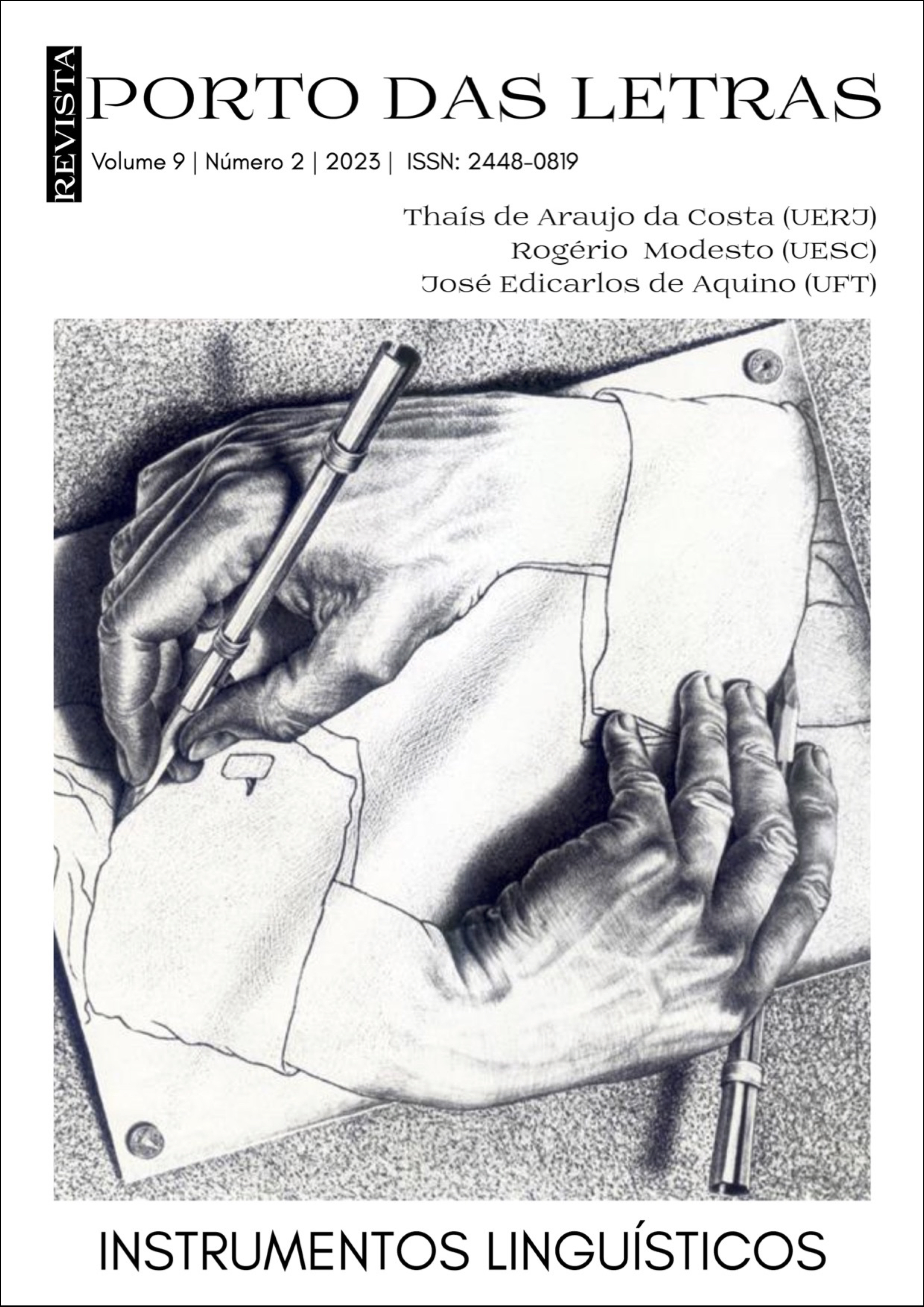Corpos e Sentidos em Disputa: Os Verbetes “Mulher” e “Homem” no Diccionario de la Lengua Española
Abstract
The way in which the feminine is enunciated rests on a memory of the condition of “being a woman”, in our society, as opposed to “being a man”. Therefore, the sayings about bodies permeate the various textualities surrounding us and signify in the form of paraphrases of the same repeatable. In this article, we aim to analyze the speeches reproduced in the entries “woman” and “man” in six different editions of the Diccionario de la Lengua Española (DLE) of the Real Academia Española. Based on the explicit corpus, we propose to observe the meanings that are repeated in the memory about the feminine and the masculine, as well as the way in which changes occur in the order of enunciation, based on the clippings produced on the definitions related to the two mottos selected for this study. Our Analysis is based on studies in the field of Materialist Discourse Analysis and the History of Linguistic Ideas. After organizing the corpus and through the analysis carried out, we were able to understand, in history and in a comparative way, how the analyzed entries reproduce places for female bodies that delimit them to the domestic space, contrary to male bodies, which can legitimately occupy the public space.
Keywords: History of Linguistic Ideas; Spanish Language Dictionary; Woman; Man.
References
AGUILAR, P; GLOZMAN, M; GRONDONA, A; HAIDAR, V. ¿Qué es un corpus? In: Entramados y perspectivas. Buenos Aires; Ano: 2014 vol. 4, p. 35 – 64.
AKOTIRENE, C. Interseccionalidade. São Paulo: Sueli Carneiro. Editora Jandaíra,
(Coleção Feminismos Plurais).
AUTOR 1. O discurso socialista cubano contemporâneo sobre a deserção: uma análise dos pronunciamentos de Fidel Castro. 2010. Dissertação. Mestrado em Letras. Instituto de Letras, Universidade Federal Fluminense, Niterói, 2010. 206 p.
AUTOR 1. SANTOS, N. C. Miss Universo 2019: Zozibini Tunzi e a memória sobre o lugar da mulher negra. In: RODRIGUES, A.; DEUSDARÁ, B.; DIAS, J. P. (Org.) Discursos em análise do/no presente. Coleção PPLIN Presente, Vol. 5. Curitiba: Editora CRV, 2023, p. 191-204.
COSTA, T. A. Alguns apontamentos para uma História da HIL na França e no Brasil. In: Língua e Instrumentos. Linguísticos. Campinas, SP, n. 44, p.9-34, jul./dez. 2019.
DICIONÁRIO GLOSBE. Disponível em: https://pt.glosbe.com/. Acesso em: 12 ago. 2023.
DAVIS, A. Mulheres, raça e classe. Trad. Heci Regina Candiani. São Paulo: Boitempo, 2016.
ESTEVES, P. M. S. O que se pode e se deve comer: uma leitura discursiva sobre sujeito e alimentação nas enciclopédias brasileiras (1863-1973). Tese. Doutorado em Estudos de Linguagem. Instituto de Letras, Universidade Federal Fluminense, Niterói, 2014. 343 p.
HORTA NUNES, J. Discurso e instrumentos lingüísticos no Brasil: dos relatos de viajantes aos primeiros dicionários. Tese. Doutorado em Linguística. Universidade Estadual de Campinas, Campinas, 1996. 267 p.
ORLANDI, E. P. Análise de Discurso: princípios e procedimentos. 8. ed. Campinas: Pontes, 2009.
LARA, L.F. Dimensiones de la lexicografía: a propósito del diccionario del español de México. México, DF: El Colegio de México, 1990.
PÊCHEUX, M. Semântica e discurso: uma crítica à afirmação do óbvio. Trad. Eni P. Orlandi et al. Campinas, SP: Editora da Unicamp, 1988 [1975].
PÊCHEUX, M. Papel da Memória. In: ACHARD, Pierre. (Org.). Papel da Memória. 2 ed. Campinas, SP: Pontes, 2007, p. 49-57.
ORLANDI, E. P. Segmentar ou recortar? In: Lingüística: questões e controvérsias. Série Estudos. Uberaba: Publicação do Curso de Letras do Centro de Ciências Humanas e Letras das Faculdades Integradas de Uberaba, 1984, p. 9-26.
PEREIRA, M. C; PACÍFICO, S. M. R; ROMÃO, L. M.S. Os sentidos produzidos sobre a mulher: discurso e silêncio. In: Espéculo. Revista de Estudios Literarios. Universidad Complutense de Madrid, 2009. Disponível em: http://www.ucm.es/info/especulo/numero42/disilenc.html. Acesso em: 10 abr. 2023.
REAL ACADEMIA ESPAÑOLA. Diccionario de la Lengua Española – Versão online. Disponível em: http://dle.rae.es/?w=diccionario. Acesso em: 27 jan. 2021.
REAL ACADEMIA ESPAÑOLA: Diccionario histórico de la lengua española (DHLE) [versão online]. Disponível em: https://webfrl.rae.es/ntllet/SrvltGUILoginNtlletPub. Acesso em: 10 jul. 2023.
Downloads
Published
How to Cite
Issue
Section
License
Os autores concordam com os termos da Declaração de Direito Autoral, que se aplicará a esta submissão caso seja publicada nesta revista (comentários ao editor podem ser incluídos a seguir).

